"Curation" is one of those words that's always conveyed coolness to me.
Take, for example, curating an art gallery, or curating music for a soundtrack. Cool, right? Content curation can be just as cool – and just as important.
Where do you get started on content curation?
In this blog post, you'll find an explanation of what it is, how it can serve your brand and a series of tools you can use at every experience level.
What is content curation?
Content curation consists of finding material relevant to your audience from a variety of sources and sharing it strategically through your communication channels.
Say you’re a marketing agency. You could write a blog post with a roundup of top product demos and add some context on why you picked them. That list of demos would be curated by you based on what you believe your audience will find most valuable.
So, now that we’ve answered, “What is curated content? ” Let’s get into the benefits of this approach.
Benefits of Content Curation
One of the biggest benefits of content curation is that it adds value to your audience.
There’s so much information out there today and most consumers don’t have the time (or the desire) to sift through hours of content. That’s where you come in.
You can figure out what matters most to them, find the content they care the most about and present it to them in a perfect bow. Who wouldn’t want that?
Think about your favorite music station, whether it’s on the radio or a streaming platform like Spotify or Pandora. While you could listen to hours of music and create your own playlists, it’s even better when someone does it for you and delivers all the hits you love most.
That develops into trust. Even if the curator drops a song you haven’t heard before, you give it a chance knowing there’s a good chance you’ll end up liking it.
The same goes for content curation. As you deliver great content, your audience starts to trust you and see you as a thought leader.
Furthermore, content curation is a great strategy for those weeks when you’re low on original content.
It’s easier to gather content from other sources than start from scratch. So when in doubt, curate content that other experts in your industry have covered.
What makes a successful content curator?
1. Content curation should be personal.
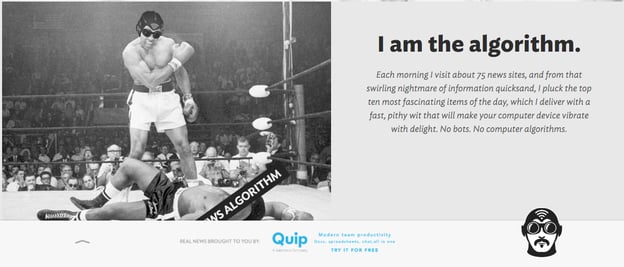
The beauty of news roundup NextDraft is the personal touch and context that its chief curator, Dave Pell, gives to each story.
I don't just want a bunch of browsable links – I want to know why I should read this stuff, and how it pertains to me. That personalized context creates a type of bond between curator and reader that link aggregators doesn’t humanize quite as much.
2. Content curation should build value.
No matter which industry your customers are in, all of them want to stay informed but also save time.
Just like you, they have demands and can’t possibly keep up with all the latest news in their industry – but they want to. Solving this problem through content curation presents a huge opportunity for brands to build a relationship with their audience.
If you can deliver a curated experience that saves your customers time in getting the information they need, you’ve taken a major step on the path of building trust and loyalty.
3. Content curation should offset promotional content.
Customers can grow tired of brands ceaselessly promoting their own wares, which is why brands must think beyond products or features.
The relationship customers have with brands today transcends the product itself. After all, that's part of the foundation of inbound marketing. While a product may initially attract you to a specific brand, it’s likely something else – like great content or remarkable service – that keeps you around.
4. Content curation shouldn’t take all day.
Once you’ve decided to curate content, the hard part begins gathering content. While bookmarking and reading lists may work in the beginning, those are not sustainable options.
Instead, there are curation tools specifically designed to help you gather, sift through, and curate content. Here’s our list below, categorized by level of expertise.
For Beginning Curators
If you occasionally share a relevant post with your customers, you’re already curating content. To build this into a scalable strategy, here are free curation tools to help you start getting in the habit of curating content, without being overwhelmed by complex tools, subscription fees, or convoluted dashboards.
1. Flipboard
Flipboard is a mobile and desktop app that allows you to create mini-magazines with links to your favorite news stories, blog posts, and websites. 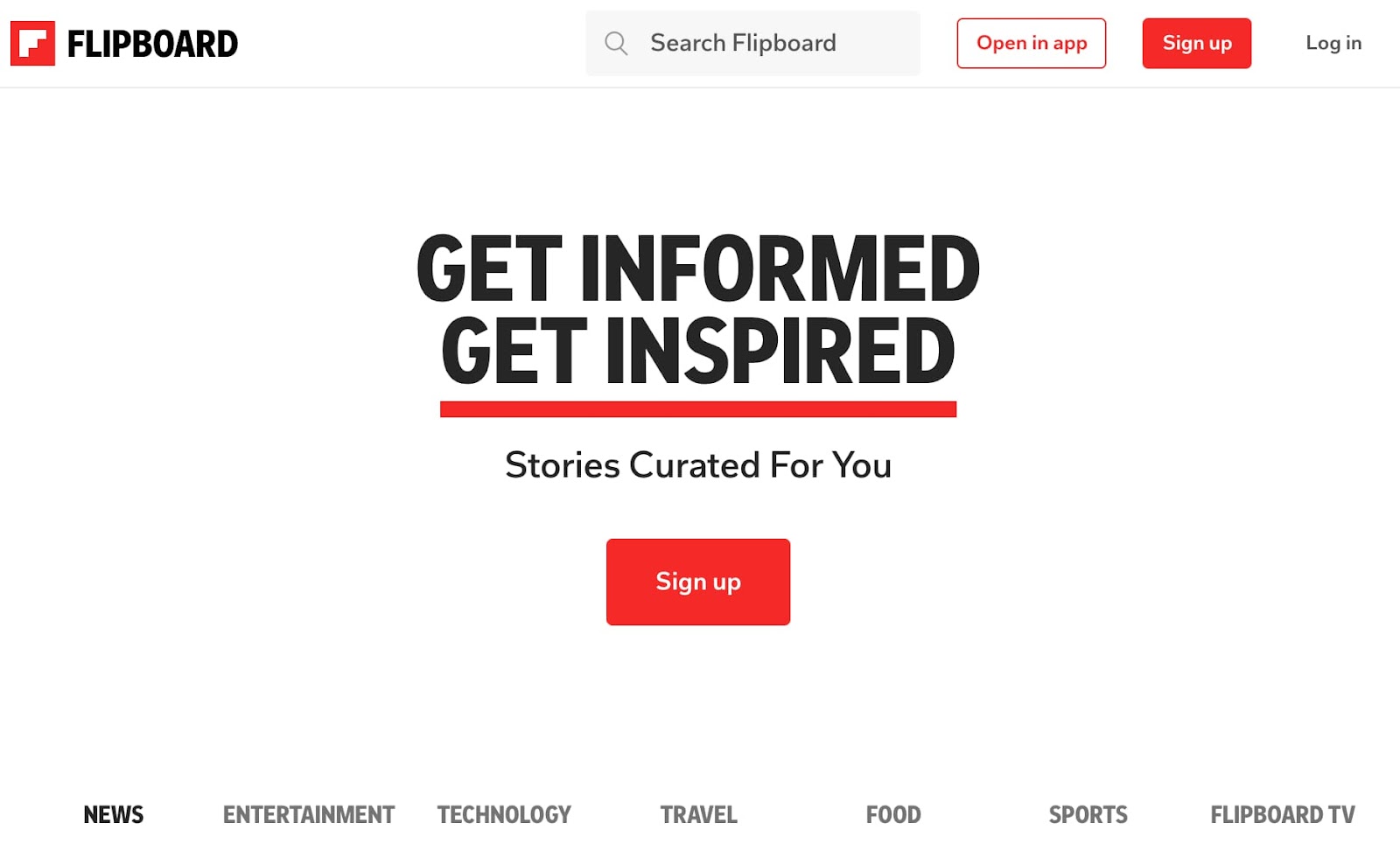
After creating these magazines, you can open them up to the public so consumers can follow your content and share them on social media networks.
You can also include your own blog posts and links in your magazine, making it an opportunity for readers to learn more about your business.
To start using Flipboard, all you need to do is download the app and create an account. You can also look through the magazines of other users and share their stories in your own mini "publication with a quick tap.
Here's a quick demo that walks you through how to use the app:
2. Pocket
Pocket is a great place to get into the habit of accruing content to save and read later.
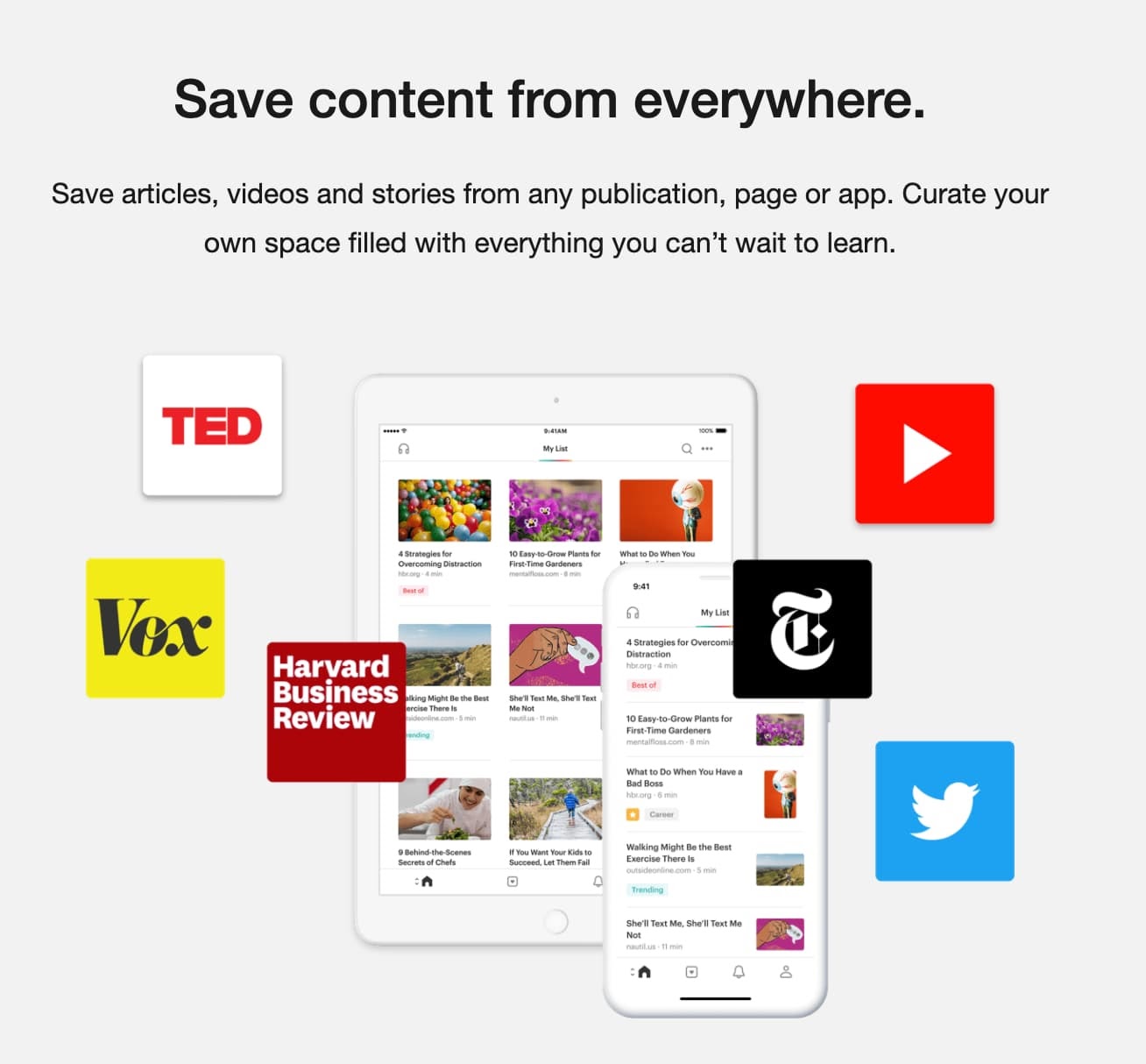
Instead of a laundry list of bookmarks or countless emails you’ve sent to yourself with links, it stores all your chosen images, articles, and videos in one place for reference.
You can group articles with tags, and the site's built-in search functionality makes finding those articles easy. Plus, it integrates with over 500 other apps, like Evernote, easy easy synching.
And as a bonus, Pocket tweets out their @PocketHits for the most-saved articles on their platform – a must-follow if you're active on Twitter.
3. Elink.io
Collecting content from various websites and sharing them in a way that is presentable and context is key to successful content curation.
Elink.io takes the pain out of content curation and allows anyone to save links on the go and turn them into beautiful, shareable content.
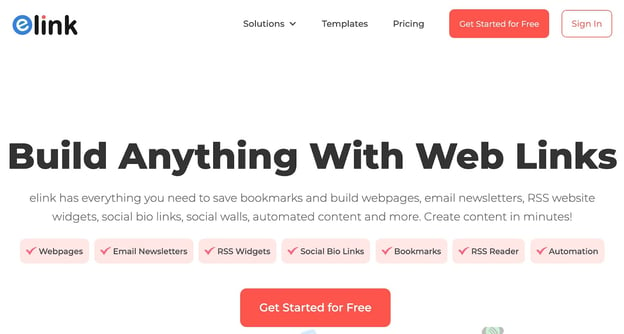
You can convert your links into a web page and embed them on a website or send them as a newsletter. They have a whopping 30+ responsive templates that you can customize to your liking. With over 80,000 users worldwide, elink is one of the best tools when it comes to fast and beautiful content curation.
4. Twitter Lists
Twitter can be hard to keep up with if you don't organize the accounts you follow. That's where Twitter Lists come in handy: curated groups of Twitter users that you can categorize and follow separately from the rest of your feed.
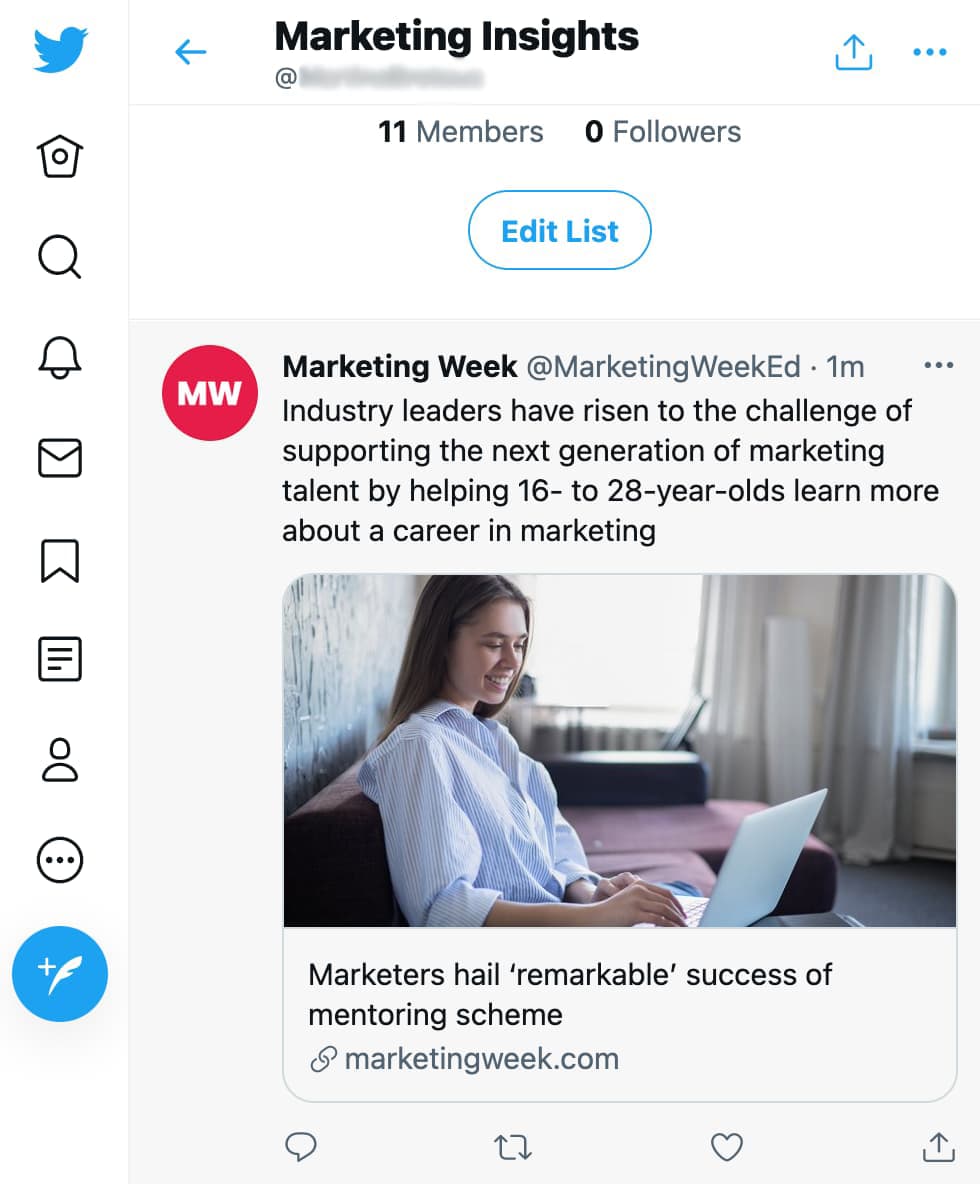
Say you curate marketing content, you could create a Twitter list for email marketing, another for blogging, and so on. Even better, you can make it public so that other Twitter users can access your lists as well.
Furthermore, if you create a Pocket account (mentioned above), you can easily save articles from Twitter directly into your account.
Click here to learn how to start your first Twitter list.
5. Newsletters
Whatever industry you’re in, stay on the lookout for newsletter subscriptions. And if a good one doesn’t exist in your industry, that’s the perfect opportunity to create one.
But before you start your own newsletter, learn from what other outlets are doing. Here are a few that are doing a great job in original content curation:
- The Hustle – Every day, The Hustle brings business and tech news right to your inbox. The team expertly breaks down top news in a witty, sharp tone that its audience enjoys – plus links to read the original content.
- The Daily Carnage – Want to stay updated on all things marketing? Carney’s got you covered. Their daily newsletter includes snippets of news in the marketing world along with a longer section that provides context for an external article they link to.
- The Daily Skimm – What this newsletter excels at is the tone and the brand voice. The team behind The Skimm knows exactly that its readers want the TLDR version of top news stories in a digestible way. Their newsletter does just that and that’s why it resonates so well with readers.
- Quartz Daily Brief: Quartz has figured out how to make a text-heavy newsletter a stalwart in the news business with its Daily Brief. The beauty of the newsletter, because it’s text-based, is the cross-platform functionality. Without heavy images, the Daily Brief loads quickly on phones, tablets, and desktops, making it easy to read on any device.
- Internet Brunch: Digital agency Big Spaceship created Internet Brunch to help folks "find the best news, GIFs, and trends from across the Internet." From holidays to current events, to celebrity birthdays, this roundup is sure to cover the important stuff that helps readers stay in the loop.
For Intermediate Content Curators
Here are some great sources for when you’ve got the basics covered and you’re looking for something a little more comprehensive.
6. Scoop.it
I like to think of Scoop.it as a nexus of content curation and social media, with a Pinterest-like user interface.
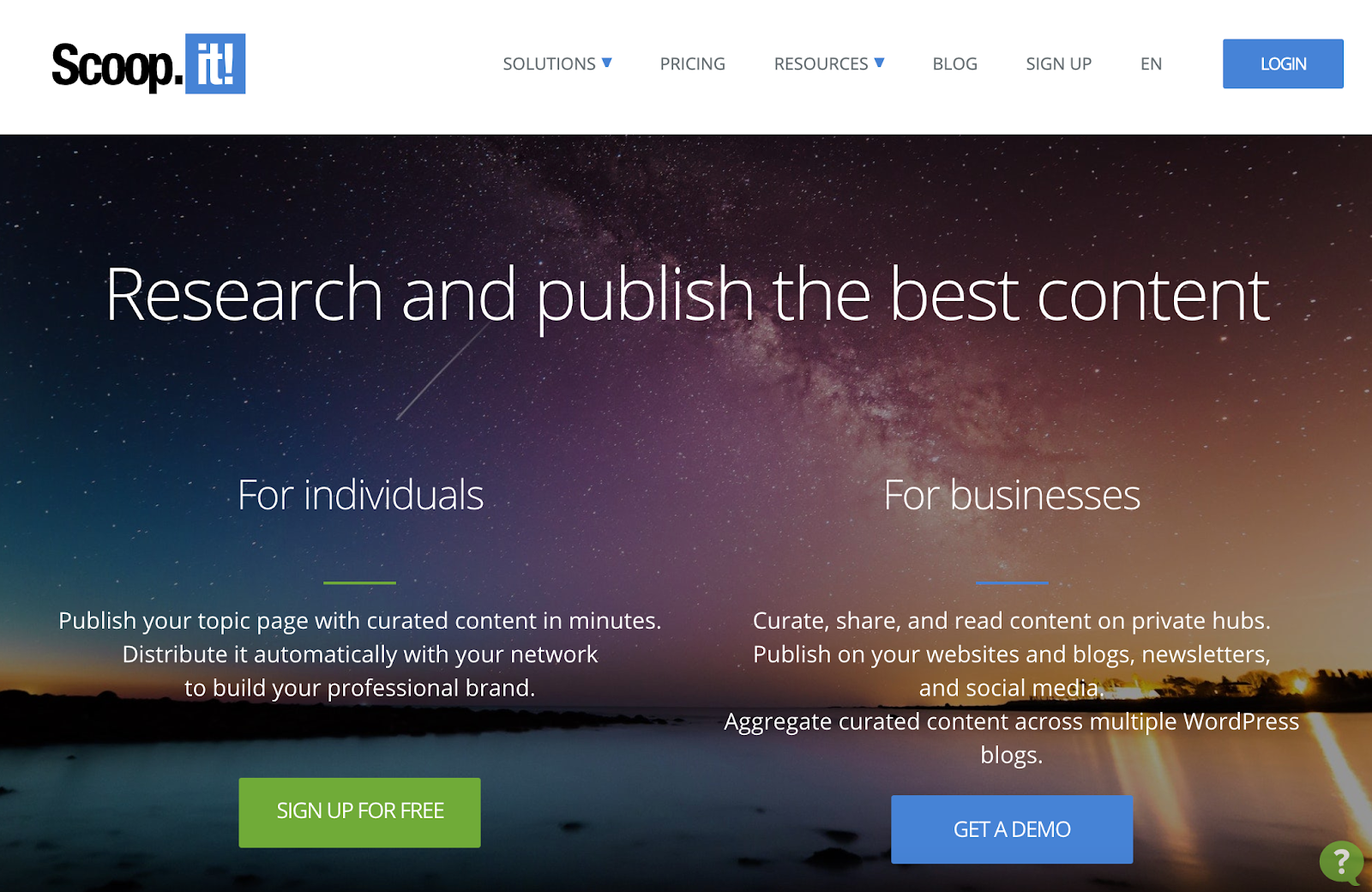
Start with a topic of interest, and Scoop.it will generate the most relevant articles to view and share as well as suggest relevant topics
Why we recommend Scoop.it:
- Their smart engine can monitor the topics you’re most interested in and identify related content you may like.
- Easy integration with WordPress.
- Content creation for multiple channels, including websites, emails, and social media
Pricing: $0 to $79/month, with customized pricing available for enterprise accounts.
7. Feedly
If you’re stepping up your content curation game, Feedly should be at the top of your list. This tool is a news aggregator powered by artificial intelligence, one the brand has named Leo. 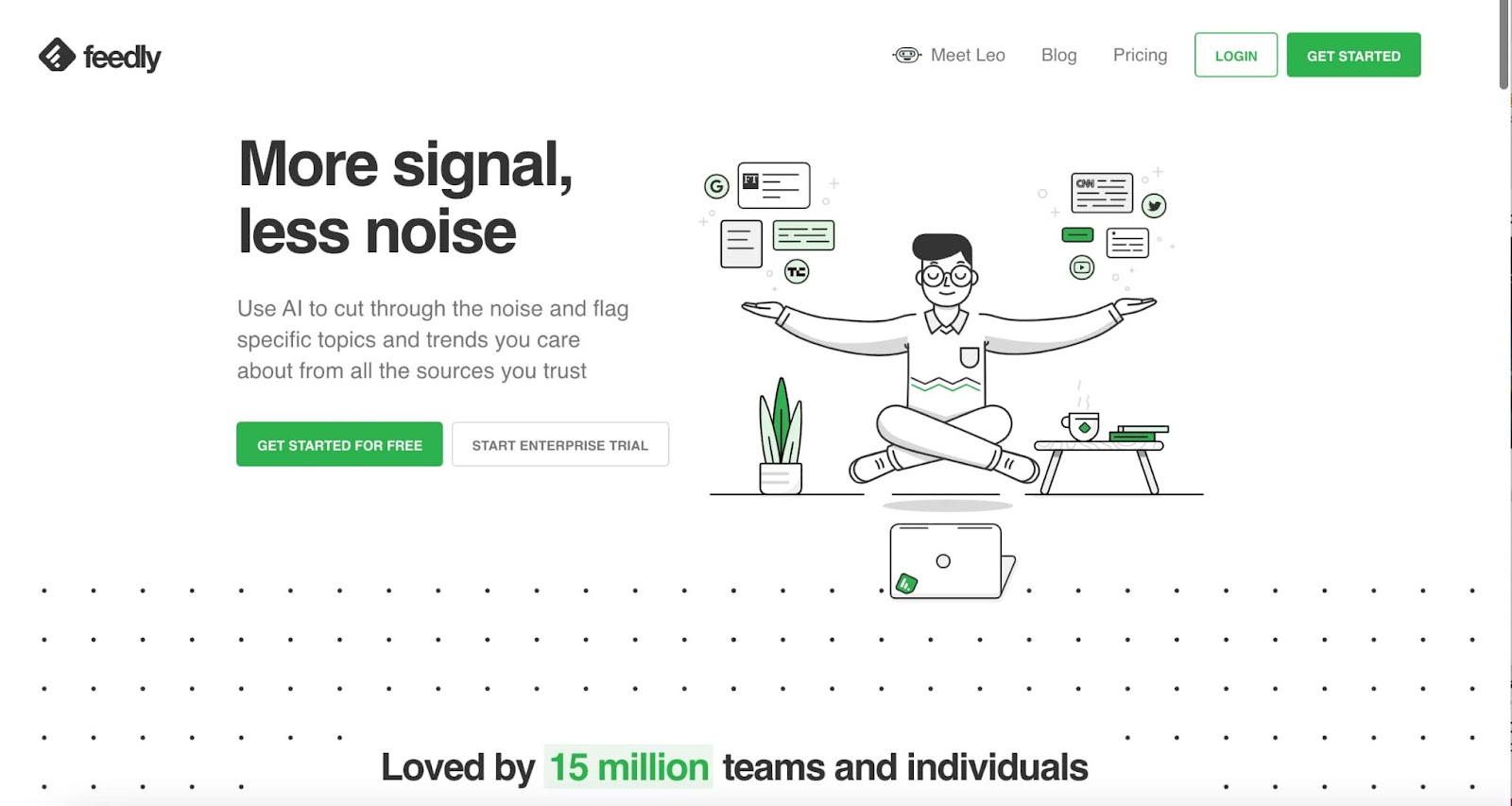 Image Source
Image Source
When you add a few of your favorite sources to Feedly, you can aggregate and browse these feeds in one place from your desktop and mobile devices.
This tool is best for filtering the content you’re interested in. Feedly leverages Leo to identify the content you care most about and filter out the ones you don’t.
Pricing: $6 to $12 a month, with a customizable plan available for enterprise accounts.
8. Sniply
You might be wondering why Sniply, a conversion platform, is on this list.
Well, this tool actually goes hand-in-hand with content curation.
Let’s say you have a monthly newsletter in which you include links to articles pertaining to your industry. With a tool like Sniply, you can place a call-to-action (CTA) on the page you’re linking to. This way, you can redirect users back to your content and help them convert.
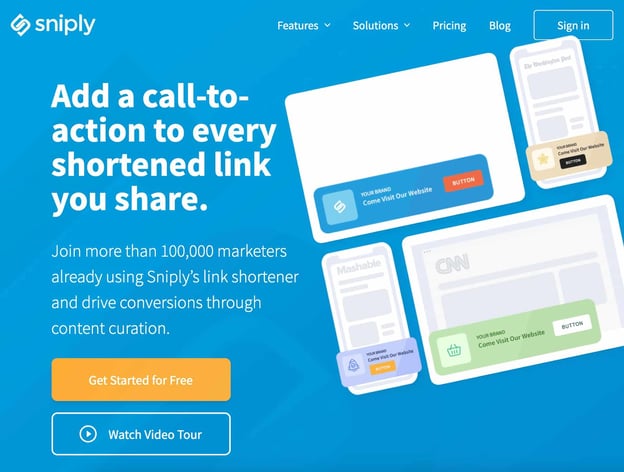
It's also a custom link shortener, so you can create branded links that are short enough to share on Twitter and the like.
Pricing: $29 - $299/month
7. Quuu
Want to focus your content curation on social media? Consider Quuu. 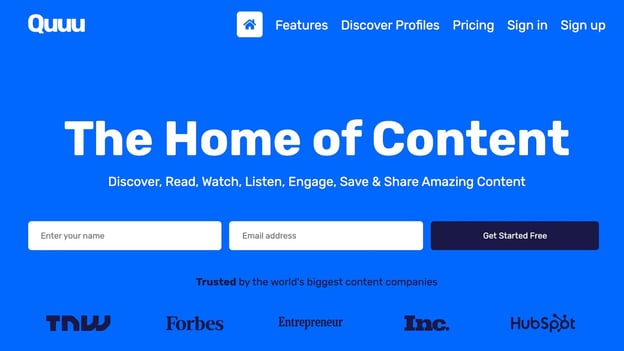 Image Source
Image Source
Quuu integrates with most major social media scheduling tools, including HubSpot, and allows you to discover and share content.
Why we recommend Quuu:
- It auto-categorizes your content, making it easier to sift through later.
- It offers reader-mode to make your experience free of distractions.
- The integrated scheduling dashboard makes it easy to share the content you discover.
Pricing: $0 to $15.83/month
9. UpContent
Are you looking for a one-stop shop for your content curation? UpContent’s got you covered.
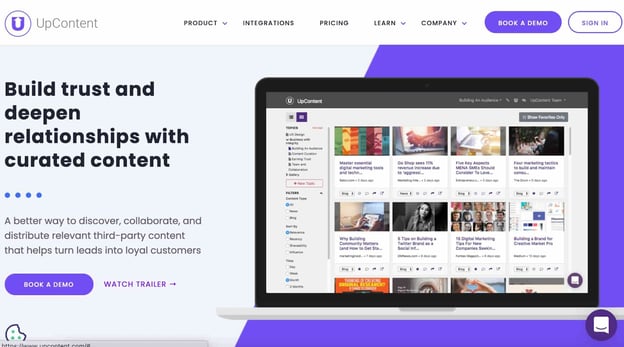
UpContent’s top features include:
- Content recommendations backed by machine learning algorithms.
- Approval workflows to ensure articles meant brands’ guidelines.
- Integration with top web hosting, social media scheduling, and email marketing software.
Pricing: $15 to $265/month
For Advanced Content Curators
Now we’re getting into some serious, enterprise-level curation software. These solutions are ideal for companies looking for a proven platform capable of supporting a team of users, editors, and content curators.
Enterprise-level curation requires advanced algorithms to find identify relevant content, a centralized publishing platform, and customizable publishing options.
10. Curata
The power of Curata lies in its ability to recommend and help you discover relevant content relevant to their respective audiences without manual labor.
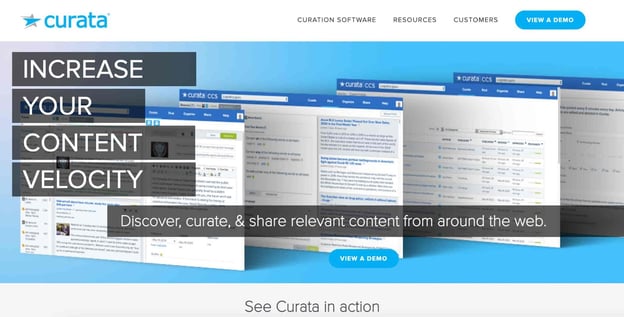
Users can fine-tune, customize, and categorize content sources for review, and then distribute them – all from one central platform.
You can then use Curata’s publishing and promotion tools to repurpose curated content across your blog, social media accounts, newsletter, and automated marketing platforms.
Pricing: Not available
Which Tool Is Right For You?
Before you select the best tools for your business, it's important to understand the role content curation will play in your marketing operations and the size of your team.
If you're a one-person marketing department, for example, the beginner and intermediate options should suffice for your needs. As your business and team grow, content curation may play a larger role and require more powerful software.
At that point, some of the advanced tools will help save time curating and ensure everyone is on the same page. Regardless of your team or business size, content curation should become a part of your content marketing strategy.
Great curators build trust with their audiences and become an indispensable resource, as they distribute content their audiences care most about.
Editor’s Note: This post was originally published in March 2015 and has been updated for accuracy and comprehensiveness.









